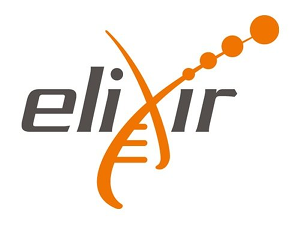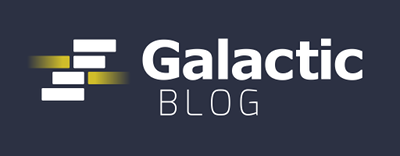December 2017 Galaxy News
Welcome to the December 2017 Galactic News, a summary of what is going on in the Galaxy community. If you have anything to add to next month’s newsletter, then please send it to outreach@galaxyproject.org.
Events
There are a plenitude of Galaxy related events coming up in the next few months:
European Galaxy Administrator Workshop
Registration opened in November for the European Galaxy Administrator Workshop.
- Mon 8 January 2018 to Fri 12 January 2018 CET
- Python room, Blindern, UiO campus, Ole Johan Dahls hus, Gaustadalléen 23B, Oslo, 0373, Norway
Although located in Europe, and named to reflect this, the workshop is definitely open to a world-wide audience. The workshop is a result of the collaboration between the ELIXIR Galaxy WG and the Galaxy Project, and so far known, this is the only Galaxy Admin workshop planned for 2018.
Participants are to cover their own travel and accommodation, while the workshop participation is free of charge.
The workshop is already close to full. If you are interested, you are encouraged to apply right now.
See the full event description for more.
Galaxy (and GMOD) at Plant and Animal Genome XXVI
The 26th Plant and Animal Genome Conference will be held January 13-17, in San Diego, California. PAG is the largest ag-genomics meeting in the world and Galaxy will be there to help researchers get the most from their data. There will be a Galaxy Workshop with 4 talks, and a Galaxy Community Update talk during the GMOD session. See the Galaxy @ PAG page for details.
GMOD @ PAG
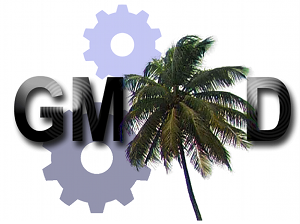
GMOD (of which Galaxy is a part) has a bunch of things going on at PAG that are of interest to the Galaxy Community:
- GMOD will have a project-wide hackathon on January 11-12.
- Meg Staton will speak about the Tripal-Galaxy bridge
- There will be a GMOD workshop on the last day of PAG.
- The Tripal Project will have a user meeting on January 11, and a hackathon on January 12. Register here.
If you are interested in supporting better integration of Galaxy with other GMOD components then please give the two hackathons a look.
Pre-PAG Intro to Galaxy Workshop at CSUSM
If you are at Cal State San Marcos, or anywhere nearby, there will be an Introduction to Galaxy Workshop in San Marcos, California on Friday January 12. The workshop is free, but space is limited, so you are encouraged to register now.
2018 Big Genomics Data Skills Training course
The Jackson Lab (JAX) is pleased to open the application period for the 2018 Big Genomics Data Skills Training course, funded by the NIH BD2K initiative: Big Genomic Skills Training info and online application. The program provides training and hands-on experience working with genomic scale data and will enable participants to integrate genomic data analysis into their courses or launch new courses. Topics covered include RNAseq, Whole Exome Sequencing and variant detection, ChIPseq and network analysis. Participants will gain experience using Galaxy, R and Python.
As a grant funded activity housing is included; however you will need to cover your own travel. If you teach at an HBCU or Minority-serving institution (by Dept. of Education criteria) JAX may be able to provide a modest travel award.
The course is for faculty who primarily teach undergraduate students and will be held at JAX Genomic Medicine in Farmington CT, May 21-25.
All Upcoming events
See the Galaxy Events Google Calendar for details on other events of interest to the community.
New Galactic Blog Entries
We’ve got two new Galactic Blog entries:
- Setup your own instance of the Galaxy Bioinformatics platform on DigitalOcean, by Vimalkumar Velayudhan
- Galaxy Docker 17.09, by Björn Grüning
The Galactic Blog is a place for longer-form posts that are relevant to Galaxy. (See Galaxy News for shorter-form items.)
The Galactic Blog needs you!
The Galaxy community needs to know what you are doing. If you have done something that others would benefit from knowing then please create a Galactic Blog post describing your experiences.
Blog posts can either be directly created on the Hub, or can be posted on your favorite blogging platform and linked to from the Blog home page. See the CONTRIBUTING page for how.
Questions? Ask us.
Publications
140 new publications referencing, using, extending, and implementing Galaxy were added to the Galaxy Publication Library in November.
Highlighted Publications
The Galactic and Stellar publications added in October were:
- Using bio.tools to generate and annotate workbench tool descriptions, Kenzo-Hugo Hillion, Ivan Kuzmin, Anton Khodak, Helena Rasche, Michael Crusoe, Hedi Peterson, Jon Ison, Hervé Ménager. F1000Research 2017, 6(ELIXIR):2074 (doi: 10.12688/f1000research.12974.1)
- Galaksio, a user friendly workflow-centric front end for Galaxy, Tomas Klingström, Rafael Hernández-de-Diego, Théo Collard, Erik Bongcam-Rudloff. EMBnet.journal, [S.l.], v. 23, p. e897, nov. 2017. ISSN 2226-6089.
- Data integration and handling, Klingström, Tomas. Doctoral thesis, Uppsala : Sveriges lantbruksuniv., Acta Universitatis agriculturae Sueciae, 1652-6880 ; 2017:99, ISBN 978-91-7760-088-6, eISBN 978-91-7760-089-3
- TED toolkit: a comprehensive approach for convenient transcriptomic profiling as a clinically-oriented application, Ali T, Kim B, Lijeron C, Ogunwobi OO, Mazumder R, Krampis K. (2017). PeerJ Preprints 5:e3385v1 https://doi.org/10.7287/peerj.preprints.3385v1
- An Accessible Proteogenomics Informatics Resource for Cancer Researchers, Matthew C. Chambers, Pratik D. Jagtap, James E. Johnson, Thomas McGowan, Praveen Kumar, Getiria Onsongo, Candace R. Guerrero, Harald Barsnes, Marc Vaudel, Lennart Martens, Björn Grüning, Ira R. Cooke, Mohammad Heydarian, Karen L. Reddy and Timothy J. Griffin. Cancer Research, DOI: 10.1158/0008-5472.CAN-17-0331 Published November 2017
- A Galaxy Implementation of Next-Generation Clustered Heatmaps for Interactive Exploration of Molecular Profiling Data, Bradley M. Broom, Michael C. Ryan, Robert E. Brown, Futa Ikeda, Mark Stucky, David W. Kane, James Melott, Chris Wakefield, Tod D. Casasent, Rehan Akbani and John N. Weinstein. Cancer Research, DOI: 10.1158/0008-5472.CAN-17-0318 Published November 2017
Publication Topics
| # | Tag | # | Tag | # | Tag | # | Tag | |||
|---|---|---|---|---|---|---|---|---|---|---|
| 83 | +Methods | 29 | +Workbench | 28 | +UsePublic | 13 | +UseLocal | |||
| 12 | +RefPublic | 8 | +Tools | 8 | +UseMain | 6 | +IsGalaxy | |||
| 3 | +Unknown | 3 | +Reproducibility | 3 | +Shared | 2 | +Other | |||
| 1 | +HowTo | 1 | +Cloud |
Who’s Hiring
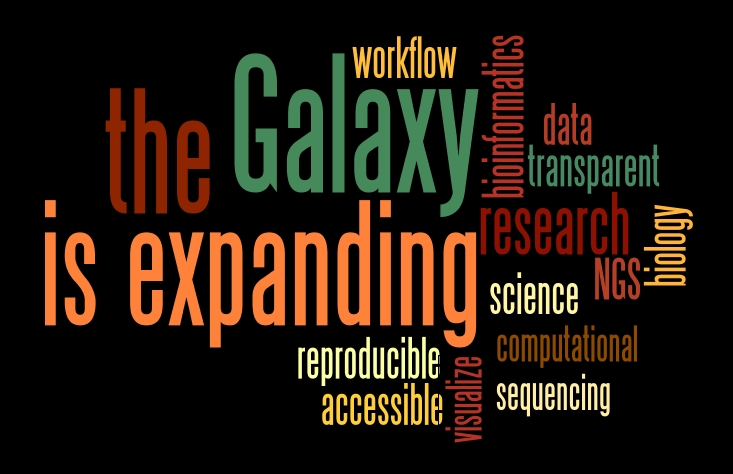
The Galaxy is expanding! Please help it grow.
- Développement de scripts R pour la mise en place d’une stratégie de traitement de données métabolomiques, et interfaçage avec la plate-forme web Galaxy, Plateforme Metabolomique BioMeT, Marseille, France
- Classification des micropolluants dans l’environnement : amélioration de l’algorithme online TyPol, INRA-LBE, Narbonne, France
- Bioinformaticien immunologie, Gustave Roussy Institute, Villejuif, France
- Bioinformaticien Gustave Roussy, Villejuif, France
- The Blankenberg Lab in the Genomic Medicine Institute at the Cleveland Clinic Lerner Research Institute is hiring postdocs.
- Galaxy Project is hiring software engineers and postdocs at Johns Hopkins, Baltimore, Maryland, United States
Have a Galaxy-related opening? Send it to outreach@galaxyproject.org and we’ll put it in the Galaxy News feed and include it in next month’s update.
Public Galaxy Server News
There are over 90 publicly accessible Galaxy servers and six semi-public Galaxy services. Here’s what happened with them in November.
MiModD 0.1.8 Released
And it’s available on the MiModD NacreousMap public Galaxy Server. MiModD is a comprehensive software package for the identification and annotation of mutations in the genomes of model organisms from whole-genome sequencing (WGS) data.
Public Servers in November’s Publications
As part of the move to Zotero, we have started tagging papers that use, mention, implement or extend public Galaxy Servers with the server name. Here are the counts for November’s papers.
| # | Tag | # | Tag | # | Tag | # | Tag | |||
|---|---|---|---|---|---|---|---|---|---|---|
| 15 | >Huttenhower | 9 | >RepeatExplorer | 5 | >Galaxy-P | 2 | >Orione | |||
| 2 | >Workflow4Metabolomics | 1 | >Cistrome | 1 | >AGEseq | 1 | >ARGalaxy | |||
| 1 | >GIO |
Tools
ToolShed Contributions
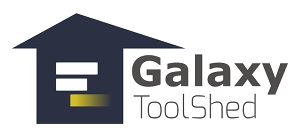 ](http://toolshed.g2.bx.psu.edu/)
](http://toolshed.g2.bx.psu.edu/)Tool Shed contributions in November.
Releases
17.09 Galaxy Release
The Galaxy Committers published the 17.09 release of Galaxy at the end of October.
Highlights include
- Singularity Tool execution using the HPC-friendly container technology Singularity is now supported.
- Download entire collection Downloading whole collections is now possible from the history interface. (Thanks to @mvdbeek.)
- Switch tool versions in workflows You can now select exactly what version of tool you want to use when building workflows. (Thanks to @mvdbeek.)
- Security patches
- Several features were deprecated
See the 17.09 release announcement for details.
Galaxy Docker Image 17.09
The Galaxy Docker project has seen a matching release, for Galaxy 17.05. Major features include
- much improved documentation about using Galaxy Docker and an external cluster (@rhpvorderman)
- CVMFS support - mounting in 4TB of pre-build reference data (@chambm)
- Singularity support and tests (compose only)
- more work on K8s support and testing (@jmchilton)
- using .env files to configure the compose setup for SLURM, Condor, K8s, SLURM-Singularity, Condor-Docker
And
- The Galaxy Docker Project has reached more than 31k downloads on Dockerhub - not counting quay.io and all flavors
galaxy-lib 17.9.10
galaxy-lib is a subset of the Galaxy core code base designed to be used as a library. This subset has minimal dependencies and should be Python 3 compatible. It’s available from GitHub and PyPi.
This revision:
- Added docs for using mulled-build with your own quay.io account (thanks to @jerowe).
- Catch errors in Conda search if nothing is found (preventing planemo-monitor from functioning properly) (thanks to @bgruening).
- Make multi-requirement container building via mulled more stable (thanks to @bgruening).
Planemo 0.47.0
Planemo is a set of command-line utilities to assist in building tools for the Galaxy project. These releases included numerous fixes and enhancements.
See GitHub for details.
Earlier Releases
Other packages that have been released in the prior 4 months.
sequence_utils 1.1.2
Galaxy’s sequence utilities are a set of Python modules for reading, analyzing, and converting sequence formats. See the release notes for what’s new this month.
StarForge 0.3.1-5
StarForge help build Galaxy things in virtualization:
- Build Galaxy Tool Shed dependencies
- Build Python Wheels (e.g. for the Galaxy Wheels Server)
- Rebuild Debian or Ubuntu source packages (for modifications)
These things will be built in Docker. Additionally, wheels can be built in QEMU/KVM virtualized systems. StarForge has had several updates this fall. Fixes and new features include:
- Support xz/lzma tarballs for wheel builds Pull Request 166
- Native support for auditwheel and delocate. (#160)
- Do not build sdists with the wheel subcommand by default. (#155)
- Fix a bug where the wrong working directory was set when building wheels with multiple sources. (#154)
- Fix a bug with sudo and brew install on macOS. (#151).
- Short circuit platform caching on OS X (#150).
BioBlend 0.10.0
BioBlend is a Python library for interacting with CloudMan and Galaxy‘s API. BioBlend makes it possible to script and automate the process of cloud infrastructure provisioning and scaling via CloudMan, and running of analyses via Galaxy.
See the release notes for what’s new in release 0.10.0.
Pulsar 0.8.0
A Pulsar update was released in September. Pulsar is a Python server application that allows a Galaxy server to run jobs on remote systems (including Windows) without requiring a shared mounted file systems. Unlike traditional Galaxy job runners - input files, scripts, and config files may be transferred to the remote system, the job is executed, and the results are transferred back to the Galaxy server - eliminating the need for a shared file system.
This release adds several features and 4 bug fixes.
nebulizer 0.4.2
Command-line utilities to help with managing users, data libraries and tools in a Galaxy instance, using the Galaxy API via the BioBlend library.
CAVEAT nebulizer is still a work in progress; please exercise caution when attempting irreversible operations especially against production Galaxy instances (for example when creating users or data libraries).
CloudBridge 0.3.3
CloudBridge aims to provide a simple layer of abstraction over different cloud providers, reducing or eliminating the need to write conditional code for each cloud. It is currently under development and is in an Alpha state.
And the rest …
Other Galaxy packages that haven’t had a release in the past four months can be found on GitHub.


